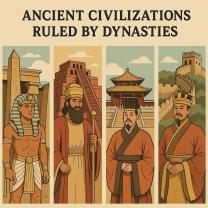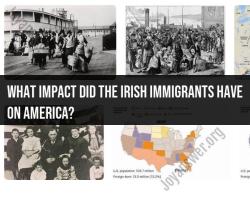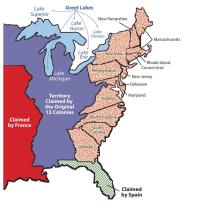What event forced many Irish citizens to immigrate to America?
The event that forced many Irish citizens to immigrate to America in large numbers during the 19th century was the Great Famine, also known as the Irish Potato Famine or the Great Hunger. The Great Famine was a devastating period of mass starvation and disease in Ireland that occurred primarily between 1845 and 1852, with its most severe years being 1846 and 1847.
The primary cause of the famine was a potato blight (Phytophthora infestans) that destroyed the potato crop, which was the staple food of the Irish population at the time. The failure of the potato crop led to widespread food shortages, famine, and a catastrophic loss of life. Additionally, Ireland was under British rule at the time, and various economic and political factors exacerbated the crisis, including land ownership issues and British policies that hindered relief efforts.
As a result of the Great Famine and the dire economic and social conditions it created in Ireland, millions of Irish people were forced to emigrate to the United States and other countries in search of better opportunities and escape from poverty and famine-related suffering. Irish immigration to the United States surged during this period, particularly in the late 1840s and early 1850s.
This wave of Irish immigration had a significant impact on American society and culture, contributing to the growth of Irish-American communities and influencing various aspects of American life, including politics, labor movements, and cultural traditions. It also left a lasting legacy in terms of the Irish-American identity and heritage in the United States.
The Great Famine, also known as the Irish Potato Famine, was a period of mass starvation, disease, and emigration in Ireland from 1845 to 1852. The famine was caused by a potato blight that destroyed the potato crop, which was the staple food of the Irish people.
The famine had a devastating impact on Ireland, with an estimated 1 million people dying and another 1 million emigrating. The majority of these emigrants came to the United States, where they settled in cities such as Boston, New York, and Philadelphia.
Irish immigration to the United States had begun long before the Great Famine, but the famine greatly accelerated the pace of immigration. In the decade before the famine, an average of 50,000 Irish people emigrated to the United States each year. In the decade after the famine, this number increased to an average of 200,000 people per year.
Irish immigrants faced many challenges in the United States. They were often discriminated against and were forced to live in poverty. However, they also made significant contributions to American society, particularly in the areas of construction, politics, and religion.
Here are some specific ways in which the Great Famine impacted Irish immigration to America:
- The famine caused a massive increase in the number of Irish people emigrating to the United States.
- Irish immigrants faced many challenges in the United States, including discrimination and poverty.
- Irish immigrants also made significant contributions to American society.
The Great Famine was a pivotal event in Irish history and had a profound impact on Irish immigration to the United States. It is estimated that over 4 million Irish people emigrated to the United States between 1845 and 1900. Today, over 30 million Americans have Irish ancestry.
The legacy of the Great Famine is still felt today, both in Ireland and in the United States. The famine is remembered as a time of great suffering and loss, but it is also remembered as a time of resilience and hope. The Irish people who emigrated to the United States in the wake of the famine helped to build a new life for themselves and their families, and they made significant contributions to the country.












